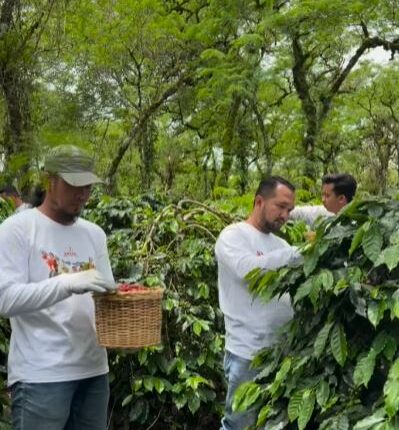AMANAH Supports President Jokowi’s Efforts to Develop Youth Competence in Agriculture
By: Zulfikar Ibrahim
The Aneuk Muda Aceh Unggul dan Hebat (AMANAH) program continues to demonstrate its commitment to developing youth competency in the agricultural sector. This initiative supports the grand vision of the seventh President of the Republic of Indonesia, Joko Widodo, which focuses on developing food sovereignty and empowering youth in the agricultural sector.
Through various activities and training, AMANAH integrates modern agricultural innovation with technical skills, enabling Aceh’s young generation to become the vanguard of national agricultural development.
In recent years, the agricultural sector has become a major focus of the government. This is in line with President Joko Widodo’s efforts to strengthen Indonesia’s food independence.
The pandemic that hit the world in 2020 emphasized the importance of the agricultural sector, because it proved to be one of the sectors that remained resilient and grew positively when other sectors experienced contraction.
The Head of State emphasized that agriculture must be an attractive and promising sector for the younger generation, so that Indonesia does not lack skilled workers in this field.
One concrete manifestation of this effort can be seen from the collaboration between the Animal Husbandry Student Association of Jabal Ghafur University (UNIGHA) Sigli and AMANAH, through one of the Agricultural-Based MSME seminar events.
The event took place at the Pidie District Agriculture Office Hall, attended by young Acehnese men and women who were enthusiastic about developing their skills in the agricultural sector. The Head of the Association, Reza Saputra, said that the seminar aimed to raise enthusiasm and create business opportunities in the agricultural sector.
The theme raised, Raise Spirit, Create Entrepreneurial Opportunities in the Agricultural Sector, reflects AMANAH’s efforts in providing insight and motivation to the younger generation.
The effort is in line with President Jokowi’s commitment, which often emphasizes the importance of regeneration in the agricultural sector. Currently, around 71 percent of Indonesia’s total farmers are over 45 years old, while young farmers under 45 years old only reach 29 percent.
The first Indonesian president who came from a regional head and not a political or military elite, hopes that more young people will be interested in entering the world of agriculture. This is important to ensure the sustainability of the sector that is the mainstay of the national economy, especially in times of global uncertainty.
A positive view also came from Teuku Hafni, Sub Coordinator of Crop and Food Production of the Pidie Agriculture Service. According to him, although the world economy is still volatile, the agricultural sector in Indonesia still offers great opportunities.
Hafni assessed that success in the sector can be achieved through three strategic steps, namely the provision of production facilities, the application of modern cultivation technology, and the processing of agricultural products. The younger generation is expected to be able to turn these challenges into opportunities, in line with the government’s direction to improve food security.
The seriousness of the government under President Jokowi’s leadership in developing the agricultural sector is also evident from the Agricola Medal award he received from FAO. This award, according to President Jokowi, is dedicated to all Indonesian people who have worked together to develop national agriculture.
Food sovereignty and independence are the main focus of the nation’s leader who was born in Surakarta City, who emphasized that food is a basic human need that must be met.
The achievement of Indonesia’s agricultural sector, which grew by 1.7 percent during the pandemic, and contributed 12.5 percent to Gross Domestic Product (GDP) in 2023, is clear evidence of the success of this policy.
The AMANAH program, an initiative of the State Intelligence Agency (BIN), also plays an important role in developing the agricultural sector in Aceh. Not only focusing on technical training, this program also seeks to introduce modern technology and innovation that can increase agricultural productivity. In the long run, this will help Acehnese youth be more competent in facing competition in local and international markets.
In addition to human resource development through training, AMANAH is also actively involved in improving agricultural infrastructure in villages. The Head of DPC APDESI Tanah Laut Regency, Samsiar, stated that village funds distributed by the government through President Jokowi’s policy have brought significant changes to villages, especially in the fields of agriculture and plantations.
The programs initiated by the Ministry of Villages, all of which originated from President Jokowi’s ideas, have accelerated equitable development and opened up greater opportunities for village communities.
Through these efforts, AMANAH fully supports the government’s food security program with a focus on the regeneration of young farmers. The younger generation must have competence not only in technical skills, but also in the use of technology and agricultural business management. This is important to ensure that agriculture remains a relevant and competitive sector in the era of globalization, in accordance with President Jokowi’s expectations.
The commitment to continuously improve youth competency through the agricultural sector will continue, considering the importance of this sector in realizing Indonesia’s food independence.
AMANAH, with all its initiatives, has demonstrated its role in supporting President Jokowi’s grand vision to create a young generation that is independent, competitive, and capable of leading Indonesia towards a more prosperous future.
*) Social and Humanitarian Observer – Aceh Mandiri Social Justice Forum
